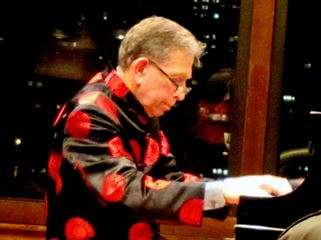|
Back
Carnival On The River New York
BargeMusic, Brooklyn
05/05/2012 -
Claude Debussy: Images, Book II
George Rochberg: Carnival Music
Franz Liszt: Sonata in B minor
Jerome Lowenthal (Pianist) 
J. Lowenthal at Bargemusic (© Coco. T. Dawg)
Dmitri Shostakovich was once queried about the “meaning” of the William Tell Overture quotes in his 15th Symphony.
He apparently seemed puzzled by the question.
“‘Meaning?’”, he asked. “I simply wanted the appropriate music. And that happened to be it.”
Methinks the late George Rochberg, like Shostakovich rarely looked for a “meaning” when he quoted, Brahms, Gershwin, Brahms, Hoagy Carmichael, Duke Ellington and Johann Sebastian Bach in his music. His Third Quartet with more than direct hints at Beethoven and Mahler was composed because his previous atonal language could not suffice for the grief at the death of his son. But after that, this eclectic, prolific, consummate composer had no hesitation in choosing his inspirations from whatever was available.
“Meaning” to Rochberg was essentially the music, by himself or others, which produced the desired goal.
Nothing is typical of Rochberg, but Carnival Music has that variance of moods and personalities which encompass his variety of worlds. (I was going to say a variance of “styles”, but Rochberg, I remember, eschewed the word style.) Five of the pieces were written for Jerome Lowenthal–and he, the benefactor, was the performer last night at BargeMusic.
Mr. Lowenthal is not a household word in music, yet his career over 67 years, since he gave a performance at the age of 13, has been an impressive one. As a recording artist, a performer, and a teacher in Juilliard’s piano department, he has collected a coterie of students and friends. And for composers like George Rochberg, the respect which engendered these pieces.
The Americanisms of Carnival are blatant. The movement called “Blues” quotes directly from a Gershwin Prelude before going onto some laconic blues works. The Toccata-rag keeps the two forms separate until the end, but the combination of American pop and Italian baroque is a complementary one.
Rochberg’s other movements are more European, in a way. The “March” of Fanfares and March smacks of Sousa, but it also smells suspiciously like Petrouchka. And the Brahms Intermezzo style from the slow movement is blatant.
Since the work was written for Mr. Lowenthal, his has to be the authoritative performance, and he delivered the goods with an experienced hand.
In fact, as one of the most experienced pianists on the circuit (though his recitals are rare these days), his personality was singular. His garb–a black shirt with huge red polka-dots –would turn eyes anywhere. (Though it was the perfect blend for the first “circus” movement of the Rochberg.) His personality also showed in the four Debussy Images, with an extra thrown in. Very sensitive playing, and a delightful “Goldfish” to finish it off.
After the intermission, Mr. Lowenthal played Liszt’s B Minor Sonata, which he had recorded several times over his 80 years, along with many other Liszt pieces. The playing here was not the most spontaneous or accurate I had heard, but his recording, including the operatic transcriptions, is still worth hearing.
BargeMusic’s own site on the river was the perfect venue to enjoy the larger-than-life moon last night (though I didn’t actually see it until returning to Manhattan). To celebrate, though, Mr. Lowenthal played not only Debussy’s “La lune descend sur le temple qui fut”, but the most luscious encore of “Clair de lune”. Those notes, so tender, so delicate, became a celebration not only of Debussy and the moon, but of Mr. Lowenthal himself.
Harry Rolnick
|